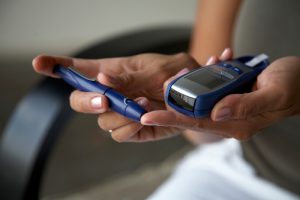 The blood glucose monitor is a device that every diabetic patient is well acquainted with. It serves to measure blood sugar levels to ensure control and proper management of the metabolic condition. The device is seen as an absolute necessity for those using insulin as their primary form of treatment. However, some type 2 diabetics are not treated with insulin. Instead, they find relative relief of their diabetes through adequate diet and exercise combined with scheduled medication doses.
The blood glucose monitor is a device that every diabetic patient is well acquainted with. It serves to measure blood sugar levels to ensure control and proper management of the metabolic condition. The device is seen as an absolute necessity for those using insulin as their primary form of treatment. However, some type 2 diabetics are not treated with insulin. Instead, they find relative relief of their diabetes through adequate diet and exercise combined with scheduled medication doses.
So does this group of diabetics need to use a glucose monitor to control their condition? This is the question a group of researchers wanted to address.
Forms of diabetes
Advertisement
There are two forms of diabetes commonly recognized—type 1 and type 2. Type 1 diabetes results from the destruction of insulin-producing cells in the pancreas, leaving little to no insulin left for the body. This makes insulin injection the only treatment method left for these patients.
Type 2 diabetes results from cells becoming resistant to insulin, with the pancreas still able to produce insulin in most cases. This makes treatment a little more complex, as medications can be used to help make cells more sensitive to insulin or decrease the amount of glucose absorbed by the body. However, there are some cases of type 2 diabetes where insulin therapy is the last line of treatment available.
Testing glucose control
The study exploring this issue involved 450 patients. These subjects were split into three groups. The first had no blood sugar monitoring, the second had only once daily glucose monitoring, and the third had enhanced daily glucose monitoring with an Internet-delivered tailored message of encouragement or instruction. Participants were followed for one year.
The researchers discovered that no significant differences in blood glucose control were seen across the three groups. Also, no significant differences were found in health-related quality of life.
Perhaps more interesting was that no differences in low blood glucose (hypoglycemia) hospitalizations or emergency visits were seen. No difference was seen in the number of individuals who had to start using insulin treatment for better glucose control as well.
“Our study results have the potential to transform current clinical practice for patients and their providers by placing a spotlight on the perennial question, ‘to test or not to test?'” said Katrina Donahue, senior author of the study.
Glucose monitors may simply be a financial burden
Advertisement
While the researchers acknowledge that certain cases exist where a diabetics physician may deem home glucose monitoring appropriate, the result of this study suggests that those not taking insulin may get little to no benefit from a device that can be quite expensive to use in the long run.
“There has been a lack of consensus, not just in the United States, but worldwide. The lack of standard guidelines makes it all the more difficult for patients, who are already struggling to manage a chronic condition. And at the end of the day, patients have to make a choice,” said the paper’s first author, Laura Young.
Those living with diabetes using blood glucose monitors may find that awareness of glucose levels could lead to improvements in their diet and lifestyle. The researchers recommend speaking to your health care provider to shed light on your own unique situation.
